For Bernadette Millard, Oman has been her home for the past four decades. After years of career as a lawyer, Bernadette along with her husband Redha Bhacker decided to give up their corporate life and moved to a 15-acre scrubland in Ash Sharqiyah to recreate their dreams at Lizq Oasis. Today Lizq Oasis, a bio-diverse plantation of native trees and vegetables, serves as an organic food hamper of Oman.
The result of a seven-year hard work of Bernadette and Redha, Lizq Oasis was first intended as a modest, weekend retreat from their busy lives in Muscat. Soon they realised that creating a liveable habitat involved more than planting a few trees around a pool. They tried their hand at agroforestry and permaculture and ultimately decided to plant as many native trees adapted to the draught as much as their water resource could support.
Today the scrubland is a diverse plantation of over 1,000 date palms, fruit and moringa trees growing alongside drought-adapted species such as neem, Arabian lilac, ghaf, tamarind, and Gliricidia. Perennial crops such as aloe vera and lemongrass are grown all year-round and in the cooler season, annual vegetable crops are sown.
Bernadette and Redha were inspired to grow organic food in Oman not only to eat and share, but also to demonstrate that even on marginal land, a diverse food forest can supply abundant organic vegetables in Oman, build healthy soil, and mitigate the harsh climate.
Read on about their tireless efforts to create an organic farm in Oman.
Could you tell us a little bit about your farming practices?
All our practices and inputs are organic – we do not use synthetic pesticides or fertilisers on our crops. We make our own plant-based fertilisers and insecticides using green and animal manures, and seed oils. However, our approach is more than organic in line with regenerative agriculture, a system of farming that aims to encourage biodiversity, improve soil health and enhance water capture. We focus on trees and tree crops because of the power of trees to transform arid landscapes by cooling soils and capturing water. Trees are also the best carbon capture technology we currently have on our planet. The Intergovernmental Panel on Climate Change says that stopping deforestation and restoring damaged forests could provide up to 30% of the climate solution.
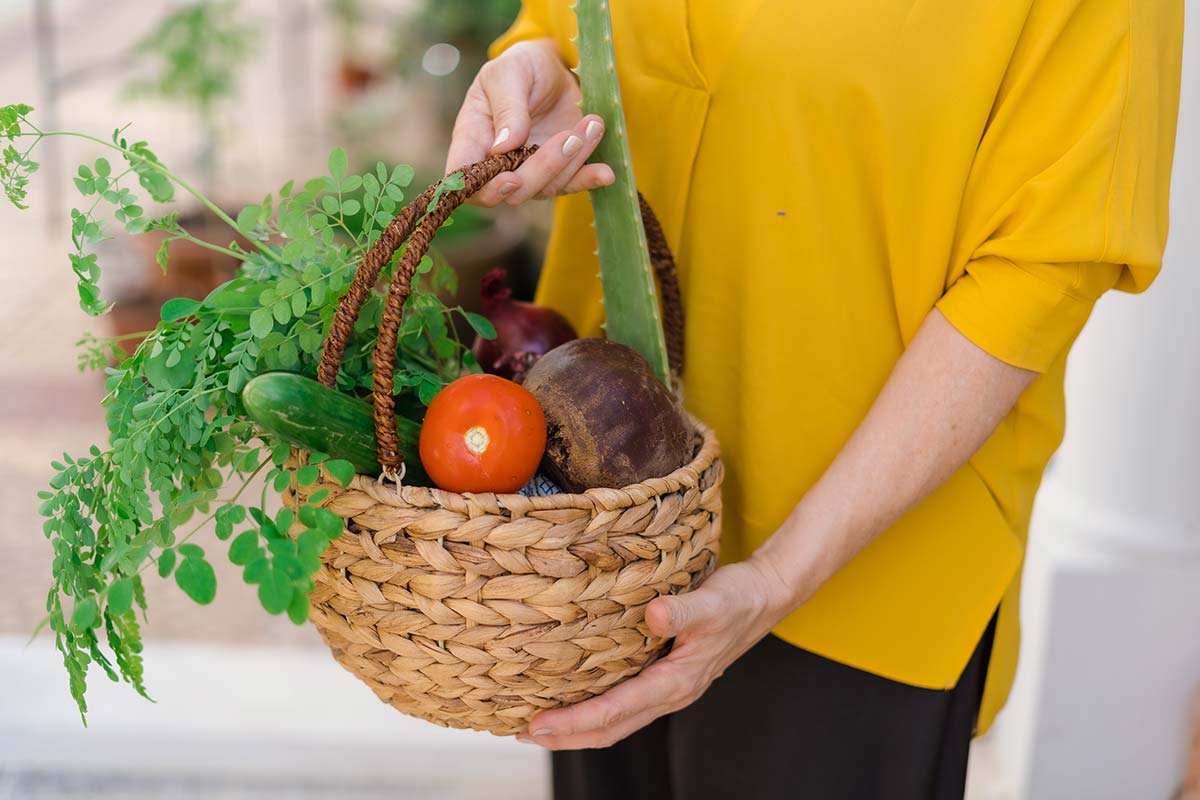
How did your brand get started, what was your idea behind Lizq Oasis Organics?
Our idea for our brand grew ‘organically’ you can say out of a desire to share our clean, pesticide-free produce as well as to introduce people to all the quality produce grown in Oman, not just by us but other local traditional farmers. Oman has been always a rich agricultural society, famous for dates, mangoes, and limes, and also for producing an amazing range of grains, seeds, red sugar, salt, vegetables and medicinal trees and plants using age-old practices that today are labelled regenerative or organic.
Unfortunately, there is a wide gulf between ‘the farm gate’ and the food ecosystem in Oman centred on large supermarket chains and imported packaged goods. We wanted to try and see if we could bridge the gap between us as local farmers and the health-conscious consumer, and restore the link that people have lost with the land on which their food is grown.
Did you face any issues when it came to establishing your brand in Oman? How did you overcome them?
Our main challenge was to reach our ideal consumer in a place and at a time convenient to them while keeping our products and produce fresh and in good condition. We found that the big supermarket chains are interested mainly in acquiring large volumes of produce as cheaply as possible, plus they usually charge the farmer additional fees for shelf space and marketing. These built-in constraints make it uneconomic and unattractive for local farmers.
However, we were fortunate to partner with the GoGreenOman store in Muscat which focuses on organic farm produce and shares our values and mission, as well as several other online platforms.
Another challenge was to source eco-friendly, quality food-grade packaging, and then to have it custom printed at a reasonable cost. This is a major gap in the market for an enterprising Omani start-up!
What do you believe are the greatest advantage of organic foods?
The greatest advantage of organic food is that it reduces your exposure to pesticides, antibiotics and hormones in meat and chicken. Studies link low-level exposure to pesticides with a whole range of adverse health conditions. Infants, children, pregnant and nursing mothers, and women of childbearing age are most at risk from exposure.
No one can yet predict the long-term health effects of routine systemic pesticide exposure through food but Europe has already placed strict limits on some pesticides. In contrast, the US is laxer, treating each chemical as ‘innocent until proven guilty’. In Oman, our first-hand experience of many farms is that pesticides are applied liberally and routinely to field crops and in greenhouses. This was the main reason why we decided in 2020 to produce organic vegetables in Oman that were safe and pesticide-free for our family, friends and the local market.
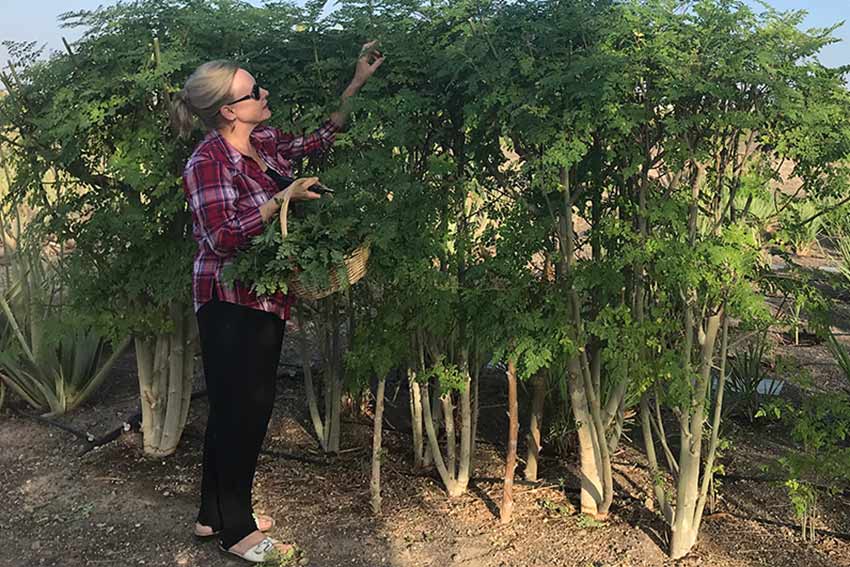
Could you provide us with some insight into the different products you sell and what health benefits they provide?
Our current range of products includes freshly dried moringa leaf powder, lemongrass tea, fresh lemongrass bulbs and aloe vera leaves, in addition to organic fruits and vegetables. The leaves of the moringa tree are a complete source of protein, rare in a plant.
Daily consumption of moringa in powdered form, in our convenient resealable pouch, provides all the essential amino acids necessary for muscle repair, energy production, and mood regulation. Moringa is also high in vitamins, minerals, antioxidants and can help regulate high blood pressure, sugar and cholesterol levels.
Our lemongrass tea makes a light, fragrant refreshing ‘teatox’ for any time of the day or can be ground to flavour dishes. Rich in antioxidants and anti-inflammatory compounds, lemongrass is used in Ayurveda to soothe coughs, colds, fever and digestive and nervous disorders as well as to alleviate menstrual pain. Place some in a muslin bag under the running tap as the tub fills for a relaxing, fragrant spa bath.
Aloe vera leaf gel is known for its skin nourishing, healing and soothing properties as well as boosting hair growth and alleviating scalp conditions like dandruff. Rich in vitamins, minerals, antioxidants and phytochemicals, aloe vera can also do wonders for digestive health when consumed on a daily basis, particularly on an empty stomach to enhance its absorption.
Today many in Oman struggle with high blood pressure, cholesterol, and BMI, all of which can lead to metabolic dysfunction and chronic heart disease or diabetes. Moving to a fresh, plant-based diet and consuming plants with medicinal properties such as moringa, aloe vera and lemongrass, can alleviate or reverse chronic conditions and prevent them from arising in the first place.
What advice do you have for conscious consumers looking to make better food choices for their families?
- Eat more plants! The health benefits of eating fruits and vegetables are well-established. A diet high in fruits and vegetables is associated with lower rates of obesity, cardiovascular disease, and some cancers.
- Stock up on organic produce when it’s at its cheapest in season. Freeze what you won’t eat in the short term so you can enjoy summer’s bounty all year long.
- Make simple, healthy home cooking the norm in your household. If you purchase high-quality, in-season, organic ingredients, you usually need nothing more than a little heat and a touch of olive oil along with some salt and pepper to make something delicious.
- Avoid white and beige processed and fried foods. Cut out added sugar: in tea, coffee, soda, fruit juices, shakes and bottled sauces, even savoury ones which contain hidden sugars. Read labels. Better still, eat mostly food without labels!
- When it comes to fresh produce get curious – ask your local supermarket where they are getting their produce from and what pesticides are used.
- Ask your supermarkets to support local farmers, better still check out some smaller local farmer shops that are cropping up around Muscat.
- Growing your own is a cheap easy option and fun for all the family!
What plans do you have for the future of your brand here in Oman? Any plans to push the products beyond Oman’s borders in the future?
For now, we are focused on extending the reach of our brand here in Oman and on bringing new health and wellness products to market. In particular, we are excited to be launching our branded unisex ‘Pure Omani’ facial oils next month. Cold-pressed from the seeds of two different moringa species grown at Lizq Oasis, these oils are rich in nourishing fatty acids, antioxidants and zeatin, a rare plant hormone said to stimulates skin cell growth and reduce signs of ageing. Moringa oil is also known for its excellent antiseptic and antimicrobial properties and for reducing pigmentation.
Despite interest in our organic products from overseas, as firm believers in ‘Buy local, Shop Small’, our priority is to serve the local market in Oman and to promote better channels of distribution for farm-fresh produce to the consumer. Hopefully, along the way, we will attract a community of like-minded people interested in pesticide-free foods, plant-based eating and regenerative agriculture. Anyone interested in our products or farm can contact us at lizqoasis.com, or on social media @lizqoasisorganics.
The home I grew up in… was loving, hectic and full of naughty, noisy kids.
When I was a child, I wanted to… fly like a bird and travel to remote places.
My greatest inspiration is… in the dawn of a very new day.
My heroes… Florence Nightingale, Nawal El Saadawi, Hanan Ashrawi, Anne Sullivan, Rosa Parks, Thor Heyerdhal, Ernest Shackleton, Antoine de Saint-Exupéry.
If I could change one thing about myself it would be… to get on and do first things first!
I dream of… a safe and sustainable future for all our children.
It’s not fashionable, but… I like wearing cardigans.
You may not know it but I’m no good at… saying no.
You may not know it but I’m very good at… making a fuss of my little goats.
If I have time to myself… I’ll do yoga, and/or watch some trashy TV series.
My house is… light, airy and full of wonderful memories of children, family and friends.
My favourite holiday destination… South of France.
My favourite weekend spot in Oman… is Lizq Oasis!

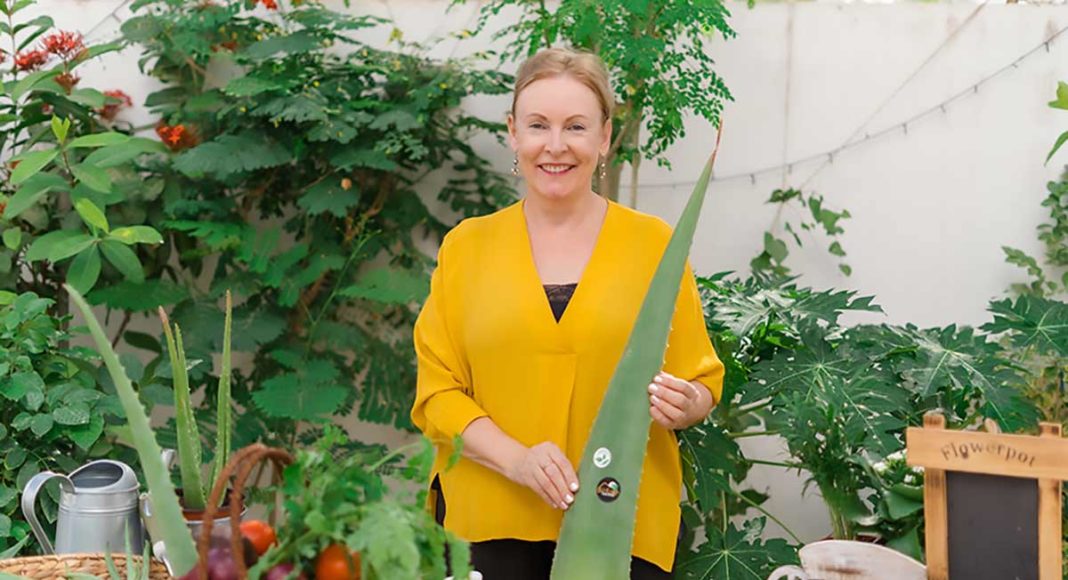
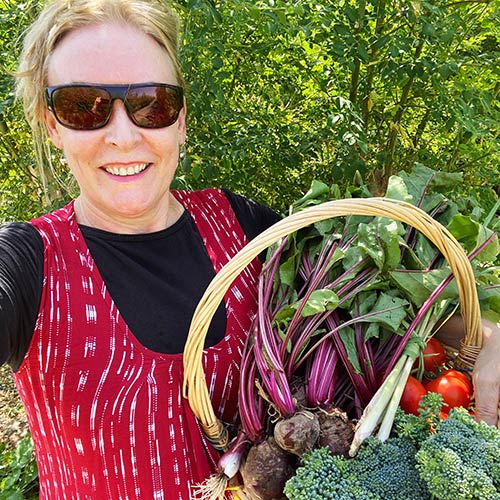
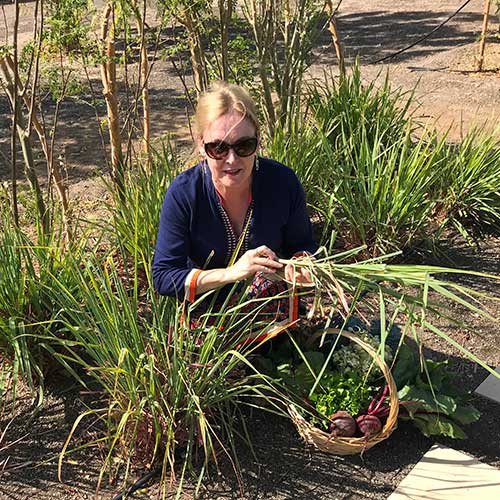
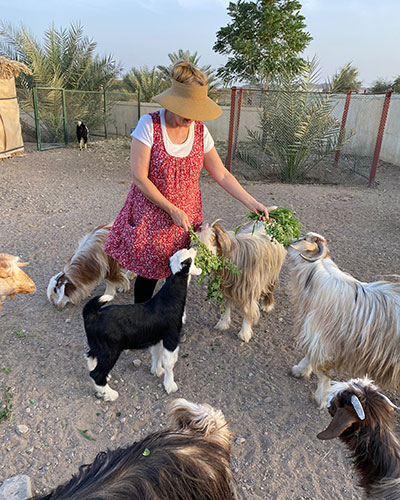
Hello. We spend the winters in Oman (Muscat) and are always searching for organic produce, especially fresh vegetables.
Please let us know where we can buy your produce. Thanks David